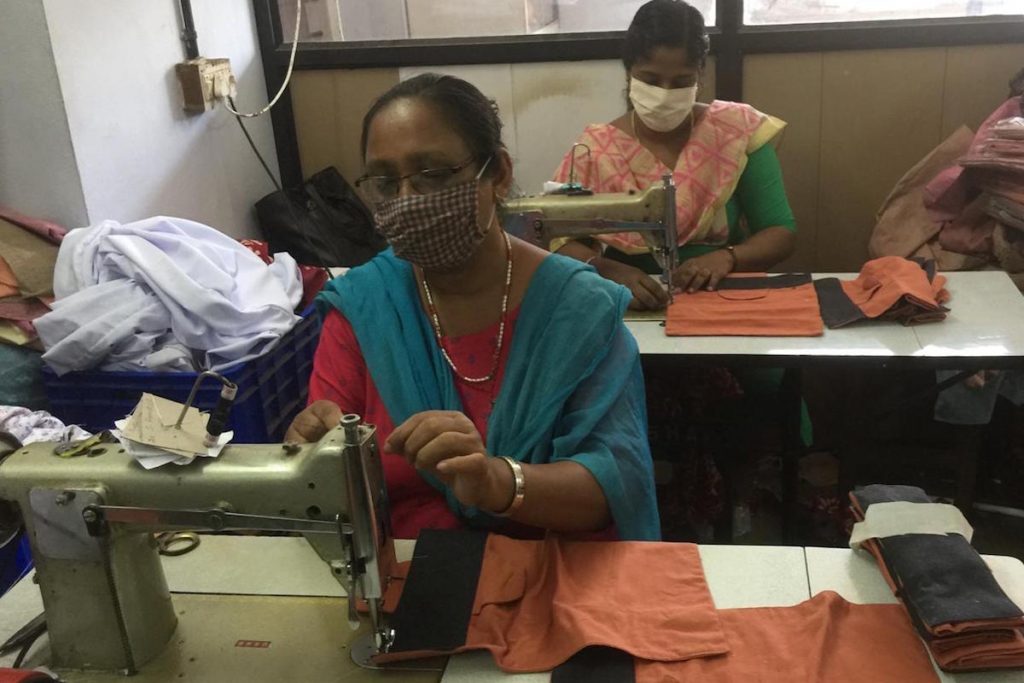Several months after giving birth to a baby girl, Maria Shami developed a severe urinary tract infection. The new mother from a remote area of the Indian state of Kerala ended up being sick for almost two months.
As part of that, the 32-year-old needed to spend more than six weeks in a hospital where medicos told her the severity of the infection was due to the low-quality sanitary pads she had used after her pregnancy.
“Using of low-cost sanitary napkins was normal until I fell ill. I now understand the risks they carry,” Shami told LiCAS.news.
Father Joseph Kalarickal, the secretary of the Changanacherry Social Service Society which works with Caritas India’s Ashakiranam Cancer Care Campaign, said menstruation hygiene is not talked about much in India, especially in rural areas.
“We became aware about the disastrous side effects of using used cloth and low-cost napkins by women only after our repeated surveys found disturbing results,” said the priest.
A 2016 survey conducted in various villages found that a majority of the women were suffering from irregularities in their menstrual cycle and many had undergone uterus removal surgery. The use of cheap plastic sanitary pads has been blamed for contributing to these issues. After the survey results Father Kalarickal said that they decided to make cotton pads and make them available to the women in the surveyed areas.
“Ten cutters and tailors began working on producing the pads made from high-quality cotton cloth. They also have with non-leaking technology, so they are safe and reusable,” Father Kalarickal said.
Abhirami Prakash, a naturopathy consultant at St. Thomas Hospital in Chethipuzha Kerela, said that the typical cheaper sanitary pads consist of a lot of plastic which can cause skin irritation and allergic reactions; creating risks of further complications.
“Cotton pads on the other hand have an absorbent cellulose core which locks away menstrual fluid to keep you dry, and a soft organic cotton cover that allows your skin to breathe,” Prakash said.
According to Patrick Hdasa, an official at Caritas India, there are at five civil districts; Kottayam, Alappuzha, Pathanamthitta, Kollam, and Thiruvananthapuram of Kerala State where these sanitary pads have been distributed.
“Live Free Cotton Sanitary Pad is the brand name of our product and it is sold at Rs 70 (US$1),” said Hdasa.
He said they are planning to do a wider distribution of the affordably-priced pads to help women in far off hamlets.

Father Kalarickal says he is also making plans to have the pads distributed via 32 diocesan social service societies in Kerala. “Later on, it could be extended through schools, colleges, and hospitals,” he said.
Father Paul Moonjely, executive director Caritas India, said the pads that the church group are making are environment friendly and pose no health risk to users.
“The aim behind this venture is to promote healthy practices among the women particularly teenagers and thus prevent the possibility of chronic disease like cervical cancer,” Father Moonjely said.
“Moreover, this product is environment friendly. In India every year 12.3 billion disposable sanitary napkins are being used without proper sanitary waste disposal systems. The non-biodegradable materials used in sanitary pads became a threat to the environmental protection of our country.”
Jessi Joseph, a volunteer who works with the Church on Ashakiranam Cancer Care Campaign, said women — young and old — have been attending menstrual health classes held in villages. “The cotton pads are distributed among the women free of cost at the first stage so that they could themselves understand why it is safe than the contaminated or low-cost pads,” Joseph said.
Geeta Nair, a church activist, said making the cotton pads available at affordable rates is the need of the hour with low quality sanitary pads being blamed for high cervical cancer rates. “But it’s ironic that the use of sanitary pads is still taboo in larger parts of the country and most women, also, cannot use them due to costs. When the product becomes affordable, its usage will naturally go up,” she said.
A study conducted by the Bill Gates Foundation last year found that 71 percent of girls in India reported having no knowledge of menstruation before their first period. The study added that it was due to the lack of awareness that these girls suffer from either a sense of guilt or severe anxiety during their first menstruation. The study further claimed that 70 percent of Indian women believed their family could not afford to buy sanitary pads.






